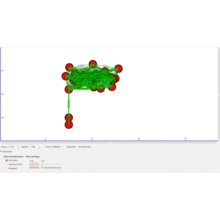Tag Archive: 'ns3 network simulator'
As miniaturized and high functional sensor devices like smartphones have spread, we can utilize large amounts of sensing data gathered from these devices. Participatory sensing is one of modern sensor-based application models in which users provide their sensing data including their personal data as well as get services. Current models, however, have limitations on flexible data flow based […]
Self-organizing dense sensor networks are expected to resolve the challenges of spectral efficiency, energy efficiency, and device management. This paper explores the use of information dependence among sensors to form a community structure of sensor data, and uses this structure to develop an information- centric processing methodology to achieve self-organizing dense sensor networks. Moreover, a data aggregator adopts ℓ1 regularization to easily enhance energy efficiency […]
In this paper, we consider the problem of social learning in a network of agents where the agents make decisions onK hypotheses sequentially and broadcast their decisions to others. Each agent in the system has a private observation that is generated by one of the hypotheses. All the observations are independently generated from the same hypothesis. We study a […]
In this paper, we extend our previous work on content retrieval in Disruption Tolerant Networks (DTNs) to support cooperative caching. Our caching scheme can adapt to the unstable network topology in DTNs, and enable the sharing and coordination of cached data among multiple nodes to reduce data access latency. Our key idea is to cache data at cluster head […]
Location-aware applications have been used widely with the assistance of the latest positioning features in Smart Phone such as GPS, AGPS, etc. However, all the existing applications gather users’ geographical data and transfer them into the pertinent information to give meaning and value. For this kind of solutions, the user’s privacy and security issues might […]
The paper presents the results of simulation verification of trust-based protection mechanism (TUBE) to attacks on a reputation systems. The authors give a short description of TUBE scheme and present a review of typical reputation attacks. The TUBE scheme supports the MANET nodes operations allowing assessment of the nodes surrounding and use of this information to increase […]
In opportunistic networks, it is difficult to predict when a node encounters others and how long it keeps in contact with another. Nodes continually attempt to explore neighbor nodes in the vicinity to transmit data. In battery-operated devices, this persistent exploration consumes a great deal of energy. In this paper, we propose an optimal energy-efficient […]
In mobile ad-hoc networks (MANETs), there are selfish nodes, which drop the received data packets, because nodes have limits of their resources. Secure routing protocols are developed as one of security mechanisms. In secure routing, each node can detect selfish nodes and decide secure paths by consulting trust values. Here, trust values express reliability for […]
Virtual warning system which is an integral component of Intelligent Transportation System (ITS) can be realized through geocasting in vehicular ad-hoc networks (VANETs). It enhances road safety and security by targeting a group of vehicles within a specified geospatial region, called Zone of Interest (ZOI) rather than an individual vehicle. Velocity of the node and […]
This paper reports experimental results on self-organizing wireless networks carried by small flying robots. Flying ad hoc networks (FANETs) composed of small unmanned aerial vehicles (UAVs) are flexible, inexpensive and fast to deploy. This makes them a very attractive technology for many civilian and military applications. Due to the high mobility of the nodes, maintaining […]

 Click Here to watch our latest output video using NS3 simulator
Click Here to watch our latest output video using NS3 simulator  Click Here to watch our latest projects screenshots using NS3 simulator
Click Here to watch our latest projects screenshots using NS3 simulator